Loss
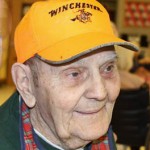
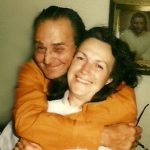 The loss of a loved one is one of the hardest of life events, and when it is a child, be it a young child or an adult child, it is even worse. For my uncle, Lester “Jim” Wolfe and my aunt, Ruth Wolfe, the loss of their adult son, Larry Wolfe in an explosion on May 16, 1976, was a devastation. They, like any parent, had a really hard time coping with the loss. They were living in Vallejo, California at the time, but after their loss, they could no longer stay there. They had to get out of California. It was then that a move to Washington state seemed their best option. I don’t know if Washington had been on their radar prior to Larry’s passing at 26 years old, or not, but they moved the entire family to the mountains outside Newport, in eastern Washington state. They purchased basically the entire mountain top, and built three cabins, where they would live out their lives.
The loss of a loved one is one of the hardest of life events, and when it is a child, be it a young child or an adult child, it is even worse. For my uncle, Lester “Jim” Wolfe and my aunt, Ruth Wolfe, the loss of their adult son, Larry Wolfe in an explosion on May 16, 1976, was a devastation. They, like any parent, had a really hard time coping with the loss. They were living in Vallejo, California at the time, but after their loss, they could no longer stay there. They had to get out of California. It was then that a move to Washington state seemed their best option. I don’t know if Washington had been on their radar prior to Larry’s passing at 26 years old, or not, but they moved the entire family to the mountains outside Newport, in eastern Washington state. They purchased basically the entire mountain top, and built three cabins, where they would live out their lives.
They lived a good life on the mountain top. They were completely off the grid, something that is common these 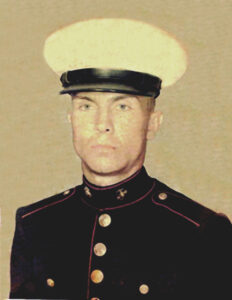 days, but not so much back then. Nevertheless, they craved total isolation, and the mountain top provided just that. Still, while they wanted to be left alone, they still enjoyed traveling, and they came out to see our family several times after that. Aunt Ruth was my dad, Allen Spencer’s sister, after all. Uncle Jim lost Aunt Ruth to cancer, on May 11, 1992, when she was just 66 years old. I’m sure he quickly learned to dread the coming of May. After that, we lost touch with them unto shortly before Uncle Jim passed away on January 30, 2013. We had reconnected with his daughter, my cousin Shirley Cameron in 2011, but by that time Uncle Jim was already in a nursing home with Dementia. We were always sad about that, but for the most part Uncle Jim was happy. His favorite things to do were strolling down the halls in his wheelchair singing and flirting with the nurses that worked there. They all loved him and thought his flirting was cute, and knowing my uncle like I did, I’m sure he was also a great jokester. He always had been, so playing pranks on the nurses came naturally. He once tried hiding in the nurses’ station but got caught. I’m not sure if his plan was to scare them or to catch one around the waist when she wasn’t looking. I wouldn’t put either choice past him. Uncle Jim was always a lighthearted person and great fun to be around. He loved to take his family camping, and maybe that was a big part of the reason the family moved to the mountains of Washington in the first place.
days, but not so much back then. Nevertheless, they craved total isolation, and the mountain top provided just that. Still, while they wanted to be left alone, they still enjoyed traveling, and they came out to see our family several times after that. Aunt Ruth was my dad, Allen Spencer’s sister, after all. Uncle Jim lost Aunt Ruth to cancer, on May 11, 1992, when she was just 66 years old. I’m sure he quickly learned to dread the coming of May. After that, we lost touch with them unto shortly before Uncle Jim passed away on January 30, 2013. We had reconnected with his daughter, my cousin Shirley Cameron in 2011, but by that time Uncle Jim was already in a nursing home with Dementia. We were always sad about that, but for the most part Uncle Jim was happy. His favorite things to do were strolling down the halls in his wheelchair singing and flirting with the nurses that worked there. They all loved him and thought his flirting was cute, and knowing my uncle like I did, I’m sure he was also a great jokester. He always had been, so playing pranks on the nurses came naturally. He once tried hiding in the nurses’ station but got caught. I’m not sure if his plan was to scare them or to catch one around the waist when she wasn’t looking. I wouldn’t put either choice past him. Uncle Jim was always a lighthearted person and great fun to be around. He loved to take his family camping, and maybe that was a big part of the reason the family moved to the mountains of Washington in the first place.
It was with heavy hearts that we attended the funeral of our uncle. My mom, Collene Spencer, sister, Cheryl 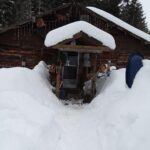
 Masterson, and I all made the trip to Washington. It was a bittersweet trip. We were happy to see their family again. We had not seen my cousin, Terry Wolfe, Shirley’s brother in many years either, although we had texted back and forth a little. We just wished that the reason for the trip had not been my Uncle Jim’s funeral. While it would have been hard, we would much rather have been able to visit him at the nursing home just once before his passing. Today would have been Uncle Jim’s 102nd birthday had he still been with us. Happy birthday in Heaven, Uncle Jim. We love and miss you very much.
Masterson, and I all made the trip to Washington. It was a bittersweet trip. We were happy to see their family again. We had not seen my cousin, Terry Wolfe, Shirley’s brother in many years either, although we had texted back and forth a little. We just wished that the reason for the trip had not been my Uncle Jim’s funeral. While it would have been hard, we would much rather have been able to visit him at the nursing home just once before his passing. Today would have been Uncle Jim’s 102nd birthday had he still been with us. Happy birthday in Heaven, Uncle Jim. We love and miss you very much.
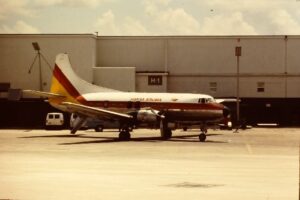 Many people have heard about the 1970 plane crash that killed the Marshall University football team, but what many people may not know is that the Marshall University crash was not the only crash that year, or even the first crash involving a football team. The first one involved the Wichita Stake Shockers football team. On Friday, October 2, 1970, at 1:14pm, in clear and calm weather, with amazing visibility, the Wichita State chartered 4-0-4 airliner crashed into a mountain peak just eight miles west of Silver Plume in Colorado. The plane, operated by Golden Eagle Aviation, the twin-engined propliner carried 37 passengers and a crew of three. Of those onboard, 29 were killed at the scene and two later died of their injuries at the hospital.
Many people have heard about the 1970 plane crash that killed the Marshall University football team, but what many people may not know is that the Marshall University crash was not the only crash that year, or even the first crash involving a football team. The first one involved the Wichita Stake Shockers football team. On Friday, October 2, 1970, at 1:14pm, in clear and calm weather, with amazing visibility, the Wichita State chartered 4-0-4 airliner crashed into a mountain peak just eight miles west of Silver Plume in Colorado. The plane, operated by Golden Eagle Aviation, the twin-engined propliner carried 37 passengers and a crew of three. Of those onboard, 29 were killed at the scene and two later died of their injuries at the hospital.
The plane was one of two 4-0-4 airliners flying the team to Logan, Utah. Three months earlier Wichita State had contracted Golden Eagle Aviation to supply a Douglas DC-6B, to fly the team to away games for the 1970 season. The four-engined DC-6 was a large, powerful aircraft that could accommodate the entire team in one plane. At the time of the contract, Golden Eagle Aviation did not own the DC-6. Nevertheless, they had made an arrangement with the Jack Richards Aircraft Company to use theirs. Unfortunately, after the agreements were made, the Jack Richards Aircraft Company DC-6 was damaged in a windstorm, so at the last minute it was unavailable for use. The two Martin 4-0-4s, hadn’t flown since 1967, so thy were quickly re-certified for flight. While it might seem like that could have been the cause of the crash, it was not. On October 2, 1970, the two 4-0-4s were ferried from the Jack Richards Aircraft Company facilities in Oklahoma City to Wichita, instead of the expected DC-6. The 4-0-4s were smaller planes, and so the team had to be split into two groups. Upon arrival in Wichita, the two aircraft were loaded with luggage and the passengers were boarded. The planes then headed west to a refueling stopover in Denver at Stapleton Airport. From Denver, they would continue to Logan Airport in northern Utah. The two planes were dubbed “Gold” and “Black” after the school colors. “Gold” was the aircraft that later crashed. It carried the starting players, head coach, and athletic director, as well as their wives, other administrators, boosters, and family. The “Black” plane transported the reserve players, assistant coaches, and other support personnel, and it took the normal route from Denver to Logan, going by way of the original flight plan and took a more northerly route, heading north from Denver to southern Wyoming then west, using a designated airway. This was less scenic, but this route allowed more time to gain altitude for the climb over the Rocky Mountains. The “Black” plane arrived safely in Utah.
The plane dubbed “Gold” took a more scenic route. The President of Golden Eagle Aviation, 37-year-old Ronald G Skipper, was the pilot flying the “Gold” plane. Normally, he would have been the pilot, but he was not rated for the 4-0-4, so he was acting as the first officer. During the flight to Denver, he visited passengers in the cabin, telling them of his plans to take a more scenic route, near Loveland Ski Area and Mount Sniktau, the proposed alpine skiing venues for the 1976 Winter Olympics, recently awarded to Denver in May. The captain of the “Gold” aircraft was 27-year-old Danny E Crocker, who occupied the right seat. While the aircraft was being refueled and serviced in Denver, First Officer Skipper purchased aeronautical sectional charts for the contemplated scenic route. The National Transportation Safety Board (NTSB) investigation report stated the First Officer testified that he intended to use the charts to help point out landmarks and objects of interest to the passengers. Unfortunately, this last-minute decision didn’t allow time to review the maps to make sure that they were traveling on a safe route, and that they were high enough to make it over the mountains.
Shortly before the crash, several witnesses described seeing an aircraft flying unusually low towards the 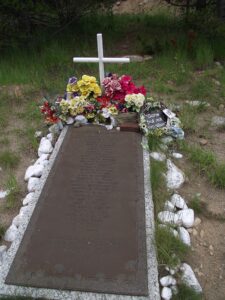
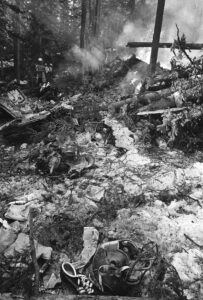 Continental Divide, which is, of course, quite high in altitude. Some witnesses who were located on higher mountainside locations, such as Loveland Pass at 11,990 feet, reported seeing it flying below them…into the mountains!! It is difficult for me to understand, how the pilots could no have seen this as a serious problem. Crash survivor Rick Stephens was a senior guard and stated in 2013, “…as we flew along over I-70, that there were old mines and old vehicles above us. I noticed we were quite a bit below the top of the mountains. I got up to go to the cockpit, which wasn’t unusual to do, and I could tell we were in trouble, looking out the window and seeing nothing but green in front of us.”
Continental Divide, which is, of course, quite high in altitude. Some witnesses who were located on higher mountainside locations, such as Loveland Pass at 11,990 feet, reported seeing it flying below them…into the mountains!! It is difficult for me to understand, how the pilots could no have seen this as a serious problem. Crash survivor Rick Stephens was a senior guard and stated in 2013, “…as we flew along over I-70, that there were old mines and old vehicles above us. I noticed we were quite a bit below the top of the mountains. I got up to go to the cockpit, which wasn’t unusual to do, and I could tell we were in trouble, looking out the window and seeing nothing but green in front of us.”
The other problem the plane had was that it was overloaded. Sadly, no one double checked the weight to make sure they were within safe limits. As the plane neared Loveland Pass, it flew up Clear Creek Valley, where it became trapped in a box canyon and was unable to climb above the mountain ridges surrounding it on three sides. It was also unable to complete a reversal turn away from the sharply rising terrain. At 1:14pm MDT, the “Gold” plane struck trees on the east slope of Mount Trelease, 1,600 feet below its summit, and crashed. The NTSB report stated that quite likely many of the passengers on board actually survived the initial impact. This was based on the testimony of survivors and rescuers. The load of fuel on board did not explode immediately. This allowed some of the survivors to escape the wreckage. Then, the passenger cabin exploded and trapped the people who were still alive. They had no way of escape. Of the 40 people on board, the death count at the scene was 29, which included 27 passengers, the captain, and flight attendant. One of the deceased passengers was an off-duty flight attendant who was assisting. Two of the initial 11 survivors later died of their injuries to bring the total dead to 31, 14 of whom were Wichita State football players. First to arrive at the crash scene were construction workers from the nearby Eisenhower Tunnel project and motorists on U.S. 6 (I-70). The first officer (company president) survived.
The National Transportation Safety Board report states that the weather did not play a role in the accident, but rather lists the probable cause to be that the pilot made improper decisions in-flight or in planning. The overloading probably played a part too, in that they couldn’t climb as fast as if they had not been overloaded. The report said that the cause was, “the intentional operation of the aircraft over a mountain valley route at an altitude from which the aircraft could neither climb over the obstructing terrain ahead, nor execute a successful course reversal, while other significant factors were the overloaded condition of the aircraft, the virtual absence of flight planning for the chosen route of flight from Denver to Logan, as well as a lack of understanding on the part of the crew of the performance capabilities and limitations of the aircraft, and the lack of operational management to monitor and appropriately control the actions of the flight crew.” It was a recipe for disaster. What I don’t understand is how the plane could have crashed less than a mile from an interstate highway that was straight and level in that area…the perfect place for an emergency landing. Why didn’t they use it?
Of course, the game was canceled, as were classes at Wichita State University. Utah State University’s football team held a memorial in the stadium where the game was to have been played…placing a wreath on the 50-yard line. Wichita State University officials and family members of the survivors were flown to Denver on an aircraft made available by Robert Docking, the Governor of Kansas. A memorial service was held on Monday, October 5th at Cessna Stadium in Wichita. The remaining members of the Wichita State team, with the NCAA and Missouri Valley Conference allowing freshman players to fill out the squad, decided to continue the 1970 season in honor of those lost. It was later designated the “Second Season.” Wichita State and Utah State had played in five of the previous six seasons, but never met again in football. Unable to fully recover from its loss, 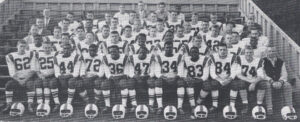 Wichita State discontinued varsity football after the 1986 season. Roadside memorial in Colorado on Interstate 70, milepost 217 Wichita State University built a memorial for those who died from the crash called Memorial ’70. Every year on October 2 at 9 a.m., a wreath is placed at this memorial. A roadside memorial plaque listing the names of the victims is located near the Colorado crash site, adjacent to westbound Interstate 70, at Dry Gulch at milepost 217, about two miles east of the Eisenhower Tunnel. A trail to the wreck site via Dry Gulch is 0.4 miles past the memorial off exit 216.
Wichita State discontinued varsity football after the 1986 season. Roadside memorial in Colorado on Interstate 70, milepost 217 Wichita State University built a memorial for those who died from the crash called Memorial ’70. Every year on October 2 at 9 a.m., a wreath is placed at this memorial. A roadside memorial plaque listing the names of the victims is located near the Colorado crash site, adjacent to westbound Interstate 70, at Dry Gulch at milepost 217, about two miles east of the Eisenhower Tunnel. A trail to the wreck site via Dry Gulch is 0.4 miles past the memorial off exit 216.

 When I first met, my husband, Bob Schulenberg’s aunt, Pearl Hein, I liked her immediately. She felt like my own aunt, even before we were married, and she became my aunt too. It was just the natural transition of it. Pearl was so welcoming and easy to get along with. I honestly don’t know anyone who didn’t love her. Bob and I used to go to Forsyth, Montana where his grandparents, aunts, uncles, and cousins lived…most of them anyway. Those who don’t live there, started out in that area. So, we tried to keep our girls, Corrie Petersen and Amy Royce, connected with that part of the family. Pearl and Uncle Eddie were a big part of those visits.
When I first met, my husband, Bob Schulenberg’s aunt, Pearl Hein, I liked her immediately. She felt like my own aunt, even before we were married, and she became my aunt too. It was just the natural transition of it. Pearl was so welcoming and easy to get along with. I honestly don’t know anyone who didn’t love her. Bob and I used to go to Forsyth, Montana where his grandparents, aunts, uncles, and cousins lived…most of them anyway. Those who don’t live there, started out in that area. So, we tried to keep our girls, Corrie Petersen and Amy Royce, connected with that part of the family. Pearl and Uncle Eddie were a big part of those visits.
In those days, Pearl was working at the IGA (a grocery store) and honestly, I think the place would have fallen apart without her. For many years she was a fixture in the place, but now she is retired and gets to spend her 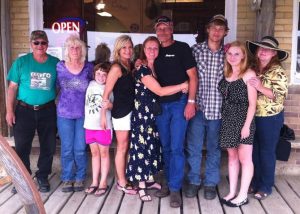
 time doing the things she wants to do. It hasn’t been exactly what she had expected or hoped, because of the loss of her husband, Eddie and then three months later, her son, Larry, but she is slowly coming back to feeling more like herself. These days, she spends some of her time visiting her daughter, Kim Arani and son-in-law, Michael Arani in Texas, and she enjoys that. Sometimes a change of scenery is just what is needed to perk a person up, and mother/daughter time is nice too.
time doing the things she wants to do. It hasn’t been exactly what she had expected or hoped, because of the loss of her husband, Eddie and then three months later, her son, Larry, but she is slowly coming back to feeling more like herself. These days, she spends some of her time visiting her daughter, Kim Arani and son-in-law, Michael Arani in Texas, and she enjoys that. Sometimes a change of scenery is just what is needed to perk a person up, and mother/daughter time is nice too.
Pearl has always had a heart for people. She tries to keep in touch with those closest to her, either by phone or text, and it is always appreciated. We are all busy in life, and so just a periodic text can be an uplifting text can be a bright spot in the day. Pearl still has family in the Forsyth area, and she enjoys getting together with them when she can. She and her sister, Rosalie 
 Steinbach were always close. They helped each other with the care of their parents, and I know their parents were grateful. Caregiving is a tough job, and Pearl knows that better than most people. Pearl is such a loving and caring person, and I’m sure that is why I felt drawn to her so much. She never thinks of herself, always others. She wants to make sure that everyone has what they need to feel comfortable and happy. That is just her nature. Everyone else, above self. That’s Pearl. Today is Pearl’s 74th birthday. Happy birthday Pearl!! Have a great day!! We love you!!
Steinbach were always close. They helped each other with the care of their parents, and I know their parents were grateful. Caregiving is a tough job, and Pearl knows that better than most people. Pearl is such a loving and caring person, and I’m sure that is why I felt drawn to her so much. She never thinks of herself, always others. She wants to make sure that everyone has what they need to feel comfortable and happy. That is just her nature. Everyone else, above self. That’s Pearl. Today is Pearl’s 74th birthday. Happy birthday Pearl!! Have a great day!! We love you!!

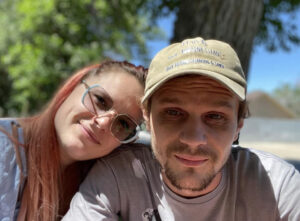 My nephew, Wesley “Wes” Burr, who is my niece, Cassie Franklin’s partner, is a very compassionate man, kind and loving. He is also a giver who would give the shirt off his back or open his home to anyone. He reminds me a lot of my grandparents in that way. He is an all-around good guy. Wes came along at a time when Cassie really needed a kind soul in her life. She had gone through an ugly divorce; the loss of her mom, Rachel Schulenberg; and her grandmother, Janice Franklin. She needed some happiness in her life, and since Wes came into her life, I have never seen her happier. They work together toward their common goals, and they are doing very well.
My nephew, Wesley “Wes” Burr, who is my niece, Cassie Franklin’s partner, is a very compassionate man, kind and loving. He is also a giver who would give the shirt off his back or open his home to anyone. He reminds me a lot of my grandparents in that way. He is an all-around good guy. Wes came along at a time when Cassie really needed a kind soul in her life. She had gone through an ugly divorce; the loss of her mom, Rachel Schulenberg; and her grandmother, Janice Franklin. She needed some happiness in her life, and since Wes came into her life, I have never seen her happier. They work together toward their common goals, and they are doing very well.
Wes loves learning, pretty much all learning, but his favorite things include history and war information. I have  to agree with his types of learning, as I am a history and war buff too, especially World War II. He is also well educated on the subject of mushrooms and gardening. Seriously, I wonder if he is related to my grandparents. They knew lots about foraging for different wild herbs, mushrooms, and berries too. It’s a great way to feed your family, and he loves helping Cassie find flowers and greenery for the crafts she makes. It’s also a great way to get the family outside and teach them about God’s garden.
to agree with his types of learning, as I am a history and war buff too, especially World War II. He is also well educated on the subject of mushrooms and gardening. Seriously, I wonder if he is related to my grandparents. They knew lots about foraging for different wild herbs, mushrooms, and berries too. It’s a great way to feed your family, and he loves helping Cassie find flowers and greenery for the crafts she makes. It’s also a great way to get the family outside and teach them about God’s garden.
Wes is also an aspiring small business owner! Two years ago, he started a cleaning company with Cassie, and it is going well. He is very capable in a number of varying tasks, one of which is changing the fluids in the cars, which as we all know saves people money. Recently he traded some work for an off roading Jeep! they live in an area with lots of places to take a Jeep off road for some family fun. Not everyone can trade work for a 
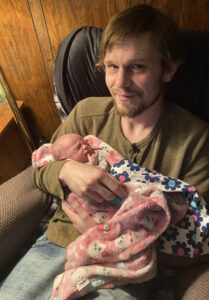 vehicle, but it is one of the perks of being self-employed. Wes loves the “nerdy” things, like Xbox and Star Trek, and he is always game for some fun with those.
vehicle, but it is one of the perks of being self-employed. Wes loves the “nerdy” things, like Xbox and Star Trek, and he is always game for some fun with those.
This past year has been a very special one for Wes. In addition to his two bonus kids, Lucas and Zoey, he and Cassie were blessed with his first child…a daughter named Alicen!! Wes is totally smitten with his baby girl, but still makes sure that Lucas and Zoey feel loved too. Recently, Zoey even started calling him Dad, and colored him a “dad” picture. It’s quite obvious that Wes loves kids, and I know he is and will always be a great dad. Today is Wes’ birthday. Happy birthday Wes!! Have a great day!! We love you!!
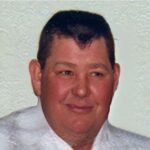
 My Uncle Elmer Johnson and his brothers remind me a bit of my dad, Al Spencer and his brother, Bill. They all had a mischievous past. I don’t think any of them were true troublemakers, but rather I think it was the era they grew up in. Kids did different things in their mischievous antics. My dad and his brother liked to set of dynamite, but then they were farm kids who, at times had a need for dynamite, like clearing a field of a big rock or tree stump. Of course, they didn’t really need to sink the gate post by two feet in an experiment with dynamite. Nevertheless, they did that. Uncle Elmer and his brothers were not above the idea of scaring their dad with the tractor, while he was using the outhouse. They tried to make him think they were going to run over the outhouse. Their dad came running out with his pants down around his ankles, and he was not happy with his boys. Nevertheless, they lived, so I guess he forgave them for their joke. Uncle Elmer’s brother, Les was his main “partner in crime” for their crazy activities.
My Uncle Elmer Johnson and his brothers remind me a bit of my dad, Al Spencer and his brother, Bill. They all had a mischievous past. I don’t think any of them were true troublemakers, but rather I think it was the era they grew up in. Kids did different things in their mischievous antics. My dad and his brother liked to set of dynamite, but then they were farm kids who, at times had a need for dynamite, like clearing a field of a big rock or tree stump. Of course, they didn’t really need to sink the gate post by two feet in an experiment with dynamite. Nevertheless, they did that. Uncle Elmer and his brothers were not above the idea of scaring their dad with the tractor, while he was using the outhouse. They tried to make him think they were going to run over the outhouse. Their dad came running out with his pants down around his ankles, and he was not happy with his boys. Nevertheless, they lived, so I guess he forgave them for their joke. Uncle Elmer’s brother, Les was his main “partner in crime” for their crazy activities.
For most of his work career, Uncle Elmer was a truck driver. He drove for a number of places, including furniture delivery, working for Burke Moving and Storage and for United Van Lines, working for Tom Aurelius. The job took him many places, and sometimes he could take his eldest son, Elmer with him. Maybe that is why they both really loved driving trucks. I’m sure they had a great time seeing all the sights and talking about everything under the sun. Those summertime trips made Uncle Elmer and Cousin Elmer good friends.
It seems like some men have skills that others don’t. I don’t know if it was that era, or what, but both my dad and Uncle Elmer, and most likely their brothers too, could cook. Yes, they could grill too, but these guys could really cook. They could cook good old fashioned comfort food, and some fancy stuff too, but mostly they were good old American down-home cooks, and that is the best kind. There aren’t many things I remember about my Uncle Elmer, not like his kids do, but the uncle that I remember was always sweet and funny. He was fun to 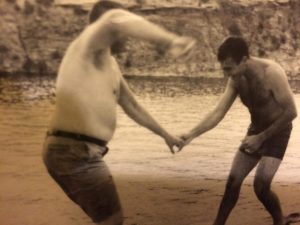
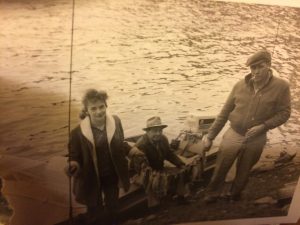 be around, and I know that my parents enjoyed spending time with Uncle Elmer and Aunt Dee too (my mom’s sister). When they were around, it always seemed that the fun accompanied them. I was 25 when Uncle Elmer went to Heaven, but I remember the feeling of loss, both for me and for his family. It was such a sad time, and that will never change. Today would have been Uncle Elmer’s 90th birthday. Happy birthday in Heaven, Uncle Elmer. We love and miss you very much.
be around, and I know that my parents enjoyed spending time with Uncle Elmer and Aunt Dee too (my mom’s sister). When they were around, it always seemed that the fun accompanied them. I was 25 when Uncle Elmer went to Heaven, but I remember the feeling of loss, both for me and for his family. It was such a sad time, and that will never change. Today would have been Uncle Elmer’s 90th birthday. Happy birthday in Heaven, Uncle Elmer. We love and miss you very much.
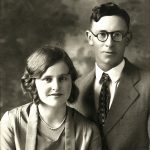
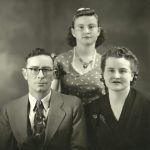 I often wonder, when thinking about couples and how they met, what might have happened if their families hadn’t moved to the state where they eventually met their spouse. Would they somehow have met in another way, like college, mutual acquaintances, or a random trip to the same city. It’s hard to say, I suppose, and the reality is that they may never have met at all. Thankfully, for my husband, Bob Schulenberg’s grandparents (and for me), his grandparents did end up in the same small town, and they did meet and married, producing Bob’s mom, Joann (Knox) Schulenberg, who gave birth to my husband. I say thankfully, of course, because if that hadn’t happened, I wouldn’t be married to my wonderful husband all these years.
I often wonder, when thinking about couples and how they met, what might have happened if their families hadn’t moved to the state where they eventually met their spouse. Would they somehow have met in another way, like college, mutual acquaintances, or a random trip to the same city. It’s hard to say, I suppose, and the reality is that they may never have met at all. Thankfully, for my husband, Bob Schulenberg’s grandparents (and for me), his grandparents did end up in the same small town, and they did meet and married, producing Bob’s mom, Joann (Knox) Schulenberg, who gave birth to my husband. I say thankfully, of course, because if that hadn’t happened, I wouldn’t be married to my wonderful husband all these years.
Grandpa, Robert Knox was born in Prosser, Washington, where his two brothers, Melburn Coe Knox and Joy Allen Knox, but on February 4, 1917, Joy Allen died 13 days after he was born on Jan 22, 1917, and by the time their next son, Richard Franklin “Frank” came along on February 4, 1920, the family was living in Rosebud, Montana. The birth of their Rainbow Baby, ironically on the same day as the death of their older son, must have been a little bit bittersweet. It seems like if the move was to get away from the memory of their loss, it actually ended up following them to the new place. All that aside, the family eventually moved to Rosebud, Montana.
Meanwhile, Grandma, Nettie (Noyes) Knox was born in Clyde Park, Montana, which was three hours and fifteen minutes from Rosebud, but the family would eventually move to Rosebud, Montana, which is, of course, where she met her future husband, Robert “Bob” Knox. They were married on June 14, 1928, in Miles City, Montana, 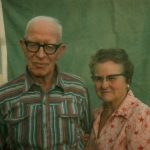
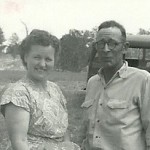 and as they say, the rest is history. While they lost their first child, a son named William Edgar Knox, at birth, they went on to have three daughters, Joann Schulenberg, Linda Cole, and Margee Kountz. They were married 57 years, until Grandpa went to heaven on December 17, 1985. Grandma lived until July 29, 1990, and then she joined him in Heaven. Today would have been their 95th anniversary. While there are no marriages in Heaven, I know Grandma and Grandpa are enjoying themselves as friends very much. Have a happy day, Grandma and Grandpa. We love and miss you very much.
and as they say, the rest is history. While they lost their first child, a son named William Edgar Knox, at birth, they went on to have three daughters, Joann Schulenberg, Linda Cole, and Margee Kountz. They were married 57 years, until Grandpa went to heaven on December 17, 1985. Grandma lived until July 29, 1990, and then she joined him in Heaven. Today would have been their 95th anniversary. While there are no marriages in Heaven, I know Grandma and Grandpa are enjoying themselves as friends very much. Have a happy day, Grandma and Grandpa. We love and miss you very much.
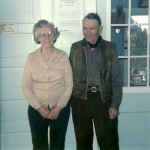
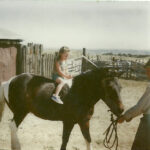 As each birthday comes and goes, I am amazed that our grandpa, Walt Hein could have been in Heaven as long as he has. Grandpa was born on May 29, 1906, which means that this is the 117th anniversary of his birth. I so enjoyed spending time with this man on our many trips to Forsyth, Montana over the years. He was so funny and was a ruthless card player. He wasn’t mean…just determined to win. That was similar to my own card playing style, so we invariably played as partners. That left the other two players, one of whom was my husband, Bob and the other who was most often grandma, Vina Hein, to play as partners, and most often lose. Grandma and Bob didn’t really care. They knew that for Grandpa, the win was a big deal, and for them, since it didn’t really matter so much, they decided that it was all in fun anyway.
As each birthday comes and goes, I am amazed that our grandpa, Walt Hein could have been in Heaven as long as he has. Grandpa was born on May 29, 1906, which means that this is the 117th anniversary of his birth. I so enjoyed spending time with this man on our many trips to Forsyth, Montana over the years. He was so funny and was a ruthless card player. He wasn’t mean…just determined to win. That was similar to my own card playing style, so we invariably played as partners. That left the other two players, one of whom was my husband, Bob and the other who was most often grandma, Vina Hein, to play as partners, and most often lose. Grandma and Bob didn’t really care. They knew that for Grandpa, the win was a big deal, and for them, since it didn’t really matter so much, they decided that it was all in fun anyway.
Our trips weren’t just about cards, however. There were many things to do on the ranch, and sometimes the 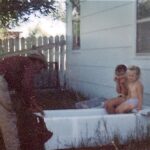 men would go out and take care of the animals, or sometimes, Grandpa would bring our girls out to the corral and lead them around of one of the horses. They had a blast riding the horses. We lived in the country, but in a much more urban kind of country area…or at least because it was subdivided, the places were smaller, and we didn’t think that our five acres could handle horses and the two cows that we raised. We felt like the beef was more important than riding horses. We also didn’t have chickens, so being around Grandma and Grandpa’s chickens was a fun experience for the. I’m not sure what the chickens thought about it, when my girls began chasing them the first time, but I know they didn’t hate that, because they would often stop and look back to see if the girls were still coming, and when they saw that they were, the chickens were off again. I think they got a kick out of it. Grandpa also had a bathtub in the yard…long before that was a thing. When the summer days got hot, Grandpa would fill that tub with water, and the girls got to go “swimming” in that tub. They had a great time, and all of these things really endeared Grandpa to them. It was that Grandpa’s heart. They were always ready to go to Forsyth to visit the family.
men would go out and take care of the animals, or sometimes, Grandpa would bring our girls out to the corral and lead them around of one of the horses. They had a blast riding the horses. We lived in the country, but in a much more urban kind of country area…or at least because it was subdivided, the places were smaller, and we didn’t think that our five acres could handle horses and the two cows that we raised. We felt like the beef was more important than riding horses. We also didn’t have chickens, so being around Grandma and Grandpa’s chickens was a fun experience for the. I’m not sure what the chickens thought about it, when my girls began chasing them the first time, but I know they didn’t hate that, because they would often stop and look back to see if the girls were still coming, and when they saw that they were, the chickens were off again. I think they got a kick out of it. Grandpa also had a bathtub in the yard…long before that was a thing. When the summer days got hot, Grandpa would fill that tub with water, and the girls got to go “swimming” in that tub. They had a great time, and all of these things really endeared Grandpa to them. It was that Grandpa’s heart. They were always ready to go to Forsyth to visit the family.
When I think about the fact that, if he were still alive, Grandpa would have been 117 years old, I am rather 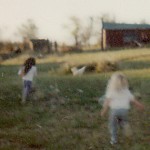
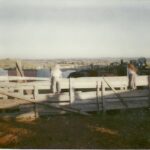 stunned. It’s so strange to think that I could have known someone who is now 117 years old. I shouldn’t be surprised, because that statement applies to all of my grandparents, and one would have been even older…one 144 years old. I suppose that as we grow older, having known people from our childhood, it will become more common to know people who are almost 200 years old. Nevertheless, it will probably never cease to amaze me. Today is the 117th anniversary of Grandpa Walt Hein’s birth. Happy birthday in Heaven, Grandpa. We love and miss you very much.
stunned. It’s so strange to think that I could have known someone who is now 117 years old. I shouldn’t be surprised, because that statement applies to all of my grandparents, and one would have been even older…one 144 years old. I suppose that as we grow older, having known people from our childhood, it will become more common to know people who are almost 200 years old. Nevertheless, it will probably never cease to amaze me. Today is the 117th anniversary of Grandpa Walt Hein’s birth. Happy birthday in Heaven, Grandpa. We love and miss you very much.
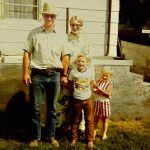
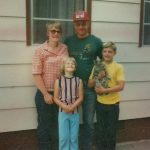 When our cousin, Larry Hein was a kid, my husband, Bob; our kids, Corrie Petersen and Amy Royce; and I went to visit family in Forsyth, Montana every summer. Larry was older than our girls by 6 and 7 years, respectively. That could have made him not want to hang out with the girls, but Larry also had a little sister, Kim Arani, and that made him able to understand the kinds of games and such that little girls wanted to play. Grandma Hein had a playhouse on the ranch she and Grandpa Hein owned, and for the girls, it was the coolest place to play. Larry didn’t mind playing house with the girls, even though it was probably not that interesting for him. He was just that kind of a kid. Easy going and a good brother and older cousin. I was thankful, because the girls wanted to get to know their cousins, and the girls and Kim wanted to play girls games.
When our cousin, Larry Hein was a kid, my husband, Bob; our kids, Corrie Petersen and Amy Royce; and I went to visit family in Forsyth, Montana every summer. Larry was older than our girls by 6 and 7 years, respectively. That could have made him not want to hang out with the girls, but Larry also had a little sister, Kim Arani, and that made him able to understand the kinds of games and such that little girls wanted to play. Grandma Hein had a playhouse on the ranch she and Grandpa Hein owned, and for the girls, it was the coolest place to play. Larry didn’t mind playing house with the girls, even though it was probably not that interesting for him. He was just that kind of a kid. Easy going and a good brother and older cousin. I was thankful, because the girls wanted to get to know their cousins, and the girls and Kim wanted to play girls games.
Larry was a big help to Grandma Hein too, as I recall. Work on a ranch is really never done, and while kids don’t usually do the work of a ranch hand, they can help with things like gardening, mucking stalls, feeding the chickens and other animals, and definitely playing with the dogs that always seem to be part of a ranch. Larry was a good-natured kid, and he loved his grandparents. He was easy to get along with, and respectful to his elders. He was always a joy to be around.
As an adult, Larry started a mechanics shop and towing service. In the small town of Forsyth, Montana, he was 
 pretty much the only show in town on those kinds of services, meaning that he was often busier than he could handle. His shop always had vehicles waiting their turn, and the towing part of the business kept him running a lot. After Larry’s dad, Ed Hein died, Larry did his best to keep his business running while helping his mom, Pearl and his sister, Kim deal with their grief. He was a good man, but Larry lost his life to a heart attack just three months and two weeks later. The two losses were devastating to the whole family. Today would have been Larry’s 54th birthday. Happy birthday in Heaven, Larry. We love and miss you very much.
pretty much the only show in town on those kinds of services, meaning that he was often busier than he could handle. His shop always had vehicles waiting their turn, and the towing part of the business kept him running a lot. After Larry’s dad, Ed Hein died, Larry did his best to keep his business running while helping his mom, Pearl and his sister, Kim deal with their grief. He was a good man, but Larry lost his life to a heart attack just three months and two weeks later. The two losses were devastating to the whole family. Today would have been Larry’s 54th birthday. Happy birthday in Heaven, Larry. We love and miss you very much.
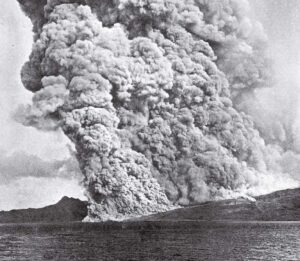 Anytime a volcano erupts, there is going to some degree of destruction, and most of the time, there is little notice. Some eruptions, however, bring more destruction and death that others. The eruption of Mount Pelée on the island of Martinique in the Caribbean on May 8, 1902, resulted in nearly 30,000 deaths and the destruction of the town of Saint Pierre. When the eruption occurred, the pyroclastic flow, also called a pyroclastic cloud, hit the town totally destroying it…or almost all of it. The city was virtually wiped off the map.
Anytime a volcano erupts, there is going to some degree of destruction, and most of the time, there is little notice. Some eruptions, however, bring more destruction and death that others. The eruption of Mount Pelée on the island of Martinique in the Caribbean on May 8, 1902, resulted in nearly 30,000 deaths and the destruction of the town of Saint Pierre. When the eruption occurred, the pyroclastic flow, also called a pyroclastic cloud, hit the town totally destroying it…or almost all of it. The city was virtually wiped off the map.
A prisoner, Ludger Sylbaris, who was born sometime around 1875. Sylbaris who used the aliases Auguste Ciparis, Joseph Surtout, and other names, was a convicted felon who had violated his parole. When he was captured, it was decided that he would be confined to an underground cell in Saint Pierre. As smoke filled the sky and lava made its way toward Saint Pierre, Sylbaris reportedly knew nothing of what was happening around him. Nevertheless, while he was right in the path of the destruction, his underground prison would end up protecting him while the rest of Saint Pierre was destroyed. The search for survivors consumed the rescue workers, and it wasn’t until four days after the city was destroyed that Sylbaris was found, half-conscious and burned.
The eruption of Mount Pelée began, or more correctly, it began to show signs on April 2, 1902. Mount Pelée, 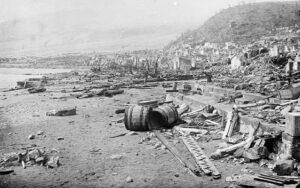 which means bald in French, was a 4,500-foot mountain on the north side of the Caribbean Island of Martinique. On April 2nd, new steam vents were spotted on the peak, which overlooked the port city of Saint Pierre. Three weeks later, tremors were felt on the island and Mount Pelée belched up a cloud of ash. That was all the warning they had, but in 1902, they might not have realized just how grave their situation was. On May 7, activity on the volcano increased dramatically and the blasts grew significantly stronger. Overnight, there were several strong tremors and a cloud of gas with a temperature of more than 3,000 degrees Fahrenheit spilled out of the mountain. Finally, a tremendous blast in the early morning hours of May 8th sent a pyroclastic flow of boiling ash down the side of the mountain. By the time anyone realized they were in serious trouble, it was too late to get away, which is what caused the 30,000 deaths. It also left the prisoner, Sylbaris in an underground cell, with no one knowing that he was there. Only a thorough search of the area and the fact that he had been housed underground, saved his life.
which means bald in French, was a 4,500-foot mountain on the north side of the Caribbean Island of Martinique. On April 2nd, new steam vents were spotted on the peak, which overlooked the port city of Saint Pierre. Three weeks later, tremors were felt on the island and Mount Pelée belched up a cloud of ash. That was all the warning they had, but in 1902, they might not have realized just how grave their situation was. On May 7, activity on the volcano increased dramatically and the blasts grew significantly stronger. Overnight, there were several strong tremors and a cloud of gas with a temperature of more than 3,000 degrees Fahrenheit spilled out of the mountain. Finally, a tremendous blast in the early morning hours of May 8th sent a pyroclastic flow of boiling ash down the side of the mountain. By the time anyone realized they were in serious trouble, it was too late to get away, which is what caused the 30,000 deaths. It also left the prisoner, Sylbaris in an underground cell, with no one knowing that he was there. Only a thorough search of the area and the fact that he had been housed underground, saved his life.
In the end, it was determined that because they were caught up in the midst of an important election, the 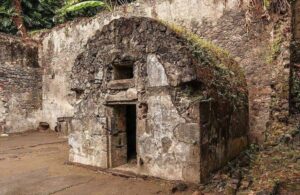 residents of Saint Pierre failed to heed the mountain’s warnings and evacuate. They mistakenly believed that the only danger from the volcano was lava flow and assumed that if lava started to flow, they would have plenty of time to flee to safety. In fact, some people came from outside the city to view the action, even after ash from the eruption began to block roads. The city of Saint Pierre was buried within minutes and virtually everyone died instantly. There were only two reported survivors, one being Sylbaris, the prisoner held in an underground cell. In addition to the destruction of the city, 15 ships in the harbor were capsized by the eruption. One ship managed to stay afloat with half the crew surviving, although most suffered serious burns.
residents of Saint Pierre failed to heed the mountain’s warnings and evacuate. They mistakenly believed that the only danger from the volcano was lava flow and assumed that if lava started to flow, they would have plenty of time to flee to safety. In fact, some people came from outside the city to view the action, even after ash from the eruption began to block roads. The city of Saint Pierre was buried within minutes and virtually everyone died instantly. There were only two reported survivors, one being Sylbaris, the prisoner held in an underground cell. In addition to the destruction of the city, 15 ships in the harbor were capsized by the eruption. One ship managed to stay afloat with half the crew surviving, although most suffered serious burns.


